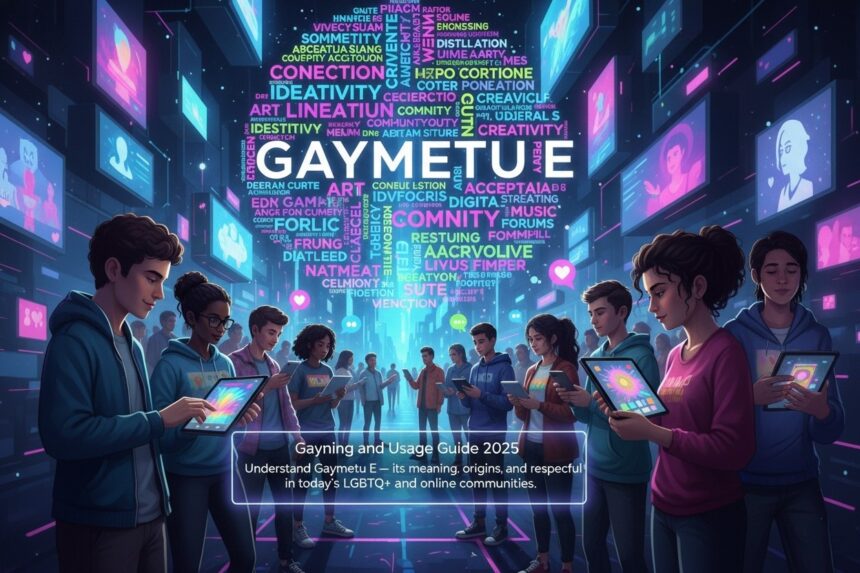What this article covers
If you’ve come across the phrase “Gaymetu E” and wondered what it means, you’re in the right place. This article explains the term clearly, shows where people use it, and offers practical guidance on respectful use. You’ll get a short history, everyday examples, and simple steps to include the idea in conversations and online spaces.
I wrote this to be useful whether you’re hearing the phrase for the first time or trying to explain it to others. I’ll name what’s known, point out what’s uncertain, and give real examples you can use.
Definition: what “Gaymetu E” means today
At its simplest, Gaymetu E has become a label used by some members of LGBTQ+ and allied communities to express belonging, identity, and shared values. It’s more than a single mood or feeling — people often use it as a shorthand that signals acceptance, creativity, and community.
Different groups might attach slightly different meanings. For some, it’s a casual tag used in chats or social posts. For others, it’s part of a creative expression, used in art, music, or short-form media. Because meanings shift with usage, clarity comes from how people use the phrase in context.
Origins and cultural context
There’s no single, published origin story for Gaymetu E. Terms that grow inside communities often form through many small conversations — inside forums, on streaming platforms, and in social media circles. That means the phrase likely evolved organically, shaped by community members rather than by a single source.
When sources are limited or inconsistent, a good approach is to treat the term as community language: respect how people who use it describe it. If you’re curious about precise roots, search for earliest uses or ask active members of the communities using the phrase; they’ll often point to the threads, posts, or creators who popularized it.
Where people use Gaymetu E: online spaces and beyond
You’ll find Gaymetu E most often in casual online spaces — social posts, thread comments, stream chats, and small community groups. In gaming and streaming cultures, short tags or phrases that carry identity or mood travel quickly; viewers and creators reuse them across channels.
In real life, the phrase can appear in informal conversations, art descriptions, or small events where people share identity and creative expression. In each setting the tone differs: on a stream it’s playful and fast; in a community meeting it might be reflective and supportive.
How people say it and short usage examples
Here are a few short, practical examples that show how the term appears in conversation:
- Social post: “Feeling a little gaymetu e today — made a playlist that fits.”
- Stream chat: “That emote gave full gaymetu energy 😄”
- Group intro: “Hi, I’m Alex — into art and queer pop culture, and I vibe with gaymetu e.”
These examples are simple; the key is matching tone to context. Online you can be playful; in private conversations, a more thoughtful use may be better.
How to use Gaymetu E respectfully
When borrowing community language, the best rule is to listen first. If you’re not part of the community where the term developed, ask how people there use it. Respect comes from checking tone and intent: if the phrase is being used as a protective or identity marker, avoid mocking or flattening it into a trend.
If you plan to use the term publicly, keep the following in mind:
- Avoid using it to label or stereotype others.
- When in doubt, ask a friend from that community whether a particular use feels appropriate.
- Use it to connect rather than to perform or tokenize.
Benefits to people and groups who use the term
For those who use Gaymetu E, the phrase can help people find one another and confirm shared values. It can create quick signals of acceptance in conversation and make online spaces feel friendlier.
There’s also a creative benefit. Words like this often form the basis for small artistic movements — short videos, playlists, or memes that carry the community’s distinctive tone. That shared creativity helps groups stay visible and build culture together.
Common misconceptions and clarifications
A few misunderstandings tend to appear with emerging terms:
- It’s not always a fad. Some people treat new words like trends that fade quickly. In many cases, such terms take root because they meet a real need — naming an experience or a feeling that previously lacked a simple label.
- It’s not universal. The term may be meaningful in some communities but unknown in others. Don’t assume everyone understands it.
- Origins may be unclear. That uncertainty doesn’t make a term less legitimate; it simply means the history is communal and evolving.
If you see someone misusing the term or missing its tone, a short, kindly correction usually helps more than calling out publicly.
Practical habits: how to integrate the idea into daily life
If Gaymetu E resonates with you, try small, practical actions:
- Keep a short journal entry noting moments when the term fit your feelings. That helps form personal meaning.
- Share a short post explaining what the term means to you. That creates context for friends who might not know it.
- Look for small community tags or groups that discuss the term and read how others use it—then contribute respectfully.
These habits ground a term in lived experience rather than in abstract definition. They also help the community keep the meaning alive and relevant.
Resources and Further Reading
When you want to learn more about a term that is new or growing in usage, it helps to read from multiple community-driven and reliable sources. The following areas are good starting points:
- Online community spaces.
Look for moderated forums or social media groups centered on LGBTQ+ language and culture. Reddit communities such as r/lgbt or r/queer may have threads where users share interpretations of Gaymetu E. - Digital media coverage.
Independent blogs and small news outlets sometimes publish early pieces about emerging language trends. These are valuable for tracing how the phrase appears in culture, art, or online spaces. - Academic or linguistic resources.
While Gaymetu E is too new to appear in major dictionaries, journals that study digital language and queer linguistics often release open-access papers about community expressions. - Local advocacy groups.
LGBTQ+ centers, student groups, or online workshops often host discussions on new cultural terms. Listening to those conversations can give you firsthand context about tone, intent, and respectful use.
When reading or participating, always verify information and respect privacy. Community language grows through trust, and the best understanding comes from direct, considerate engagement.
Conclusion — what “Gaymetu E” teaches us about language and connection
The term Gaymetu E shows how language keeps evolving to capture identity, emotion, and creativity. It began as a phrase within connected digital spaces and now signals shared understanding among those who use it. Whether it means a feeling, an attitude, or simply a shorthand for belonging, its importance lies in the connection it fosters.
For anyone learning about it, the most respectful approach is to listen, observe, and ask questions with genuine interest. Words that form inside communities deserve the same care we give to people: they thrive when treated with context and kindness.
As Gaymetu E continues to appear across online platforms, its meaning may shift, and that’s a healthy sign of living language. If it resonates with you, use it thoughtfully. If it’s unfamiliar, stay curious and keep learning from those who understand it best. Language grows when more people participate responsibly — and Gaymetu E is a reminder of how creativity and empathy shape the way we communicate.
FAQ
- What does “Gaymetu E” mean?
It’s an emerging expression within some LGBTQ+ and online communities. People use it to convey shared identity, creative energy, or a sense of belonging. - Where did “Gaymetu E” come from?
Its exact origin isn’t documented, but it appears to have formed in online gaming and social-media circles where users exchange inclusive language. - Is it okay for anyone to use “Gaymetu E”?
Yes, as long as it’s used respectfully and without mocking or stereotyping. Listen to how the community uses it and match that tone. - Why is “Gaymetu E” becoming popular?
Because it expresses connection and self-expression in a simple way, it spreads quickly in online conversations and creative spaces. - Is “Gaymetu E” offensive?
No, it isn’t considered offensive when used correctly. Misuse usually happens when people treat it as a joke or ignore its context. - How can I stay updated on new terms like “Gaymetu E”?
Follow reputable LGBTQ+ news sites, join moderated online groups, and read linguistic discussions about digital slang and community culture.







